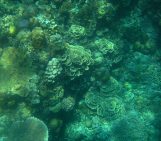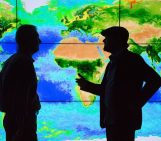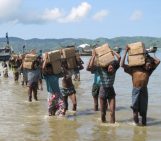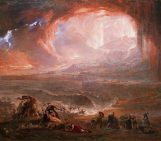
Each month, Jesse Zondervan picks his favourite posts from geoscience and development blogs/news which cover the geology for global development interest. Here’s a round-up of Jesse’s favourite selections for the first three months of 2020: [Editor’s note: This post reflects Jesse’s personal opinions. These opinions may not reflect official policy positions of Geology for Global Development.]
For many people, their news feeds consist of largely coronavirus updates. Not surprisingly, global development news is also overwhelmed with responses to the current crisis. Whilst other ideas and news are very welcome, I would still like to recognise some of the interesting points made by various authors on the parallel between the current coronavirus crisis and climate change.
Whilst first and foremost the pandemic is not desirable, to say the least, some authors point to a potentially positive outcome for the future of development and our response to climate change. Annalisa Prizzon argues “the unprecedented systemic challenges posed by the coronavirus crisis, and the responses we have already seen will fast-track the transformation of an old paradigm of donor-recipient aid relations towards a model of international cooperation between all countries.” That is, the presence of Cuban and Chinese doctors in Italy and other European countries put the traditional labels of ‘donor’ and ‘receiver’ upside down.
Climate change and pandemics are not two completely separate crises either, as Jennifer Zhang points out in State of the Planet (see also the end-of-2019 #GfGDpicks). Changing the boundaries of existing animal habitats and forcing the migration of human population both increase the risk for disease outbreaks. The increased collaboration between climate scientists and epidemiologists leads to new tools to tackle health problems around the world.
For many, including Rebecca Nadin from the Overseas Development Institute, the level, and speed of action taken by governments around the world show potential for tackling the climate emergency that many of those same governments declared last year. In this direction, viewpoints such as those of Indian professor Navroz Dubash are helpful in reminding us that low pollution nonetheless is an unacceptable bargain for causing hardship for millions. ‘Yet’, he writes, ‘experiencing much quieter, cleaner environment can spark the imagination’.
Whatever world emerges from today, I and many authors have hope that we can make it better together.
How Geology can ease your mind
This is the title of an excerpt from Marcio Bjornerud’s new book Timefulness: How Earth’s Deep Past Can Change the Way We See the Future. Now, more than ever, I urge you to marvel at the wonder and powers of time travel and to join Bjornerud in her powerful narrative. Take comfort that we live on a very old, durable planet.
More in this collection of GfGD Picks: how newly planted mangroves help conserve Cambodia’s coastline, the environmental and socio-political future of the Arctic and how women’s leadership helps rural and remote communities access early warning and disaster information.
As always, there is more to explore (especially this time!), check below for more (much more) news and ideas. Don’t forget the productivity tips at the end!
[Editor’s note: This post reflects Jesse’s personal opinions. These opinions may not reflect official policy positions of Geology for Global Development.]
Coronavirus coverage
How coronavirus is accelerating a new approach to international cooperation by Annalisa Prizzon at the Overseas Development Institute
What the world’s response to coronavirus can teach us about tackling the climate emergency by Rebecca Nadin at the Overseas Development Institute
OPINION: Imagining a different, better future by Navroz Dubash at the Climate & Development Knowledge Network
Here’s what the coronavirus pandemic can teach us about tackling climate change by Natasha Chassagne at The Conversation
Coronavirus: world’s response has slashed CO₂ emissions – here’s how to keep them down by Simone Abrams at The Conversation
Coronavirus and climate change are two crises that need humanity to unite by Andrew Norton at the International Institute for Environment and Development (iied)
How Coronavirus Is Affecting Communities in Glacier Regions by Peter Deneen at Glacierhub
What Coronavirus and Climate Change Have in Common by Elva Bennet at State of the Planet
What Can We Learn From Covid-19 to Help With Climate Change? By Renee Cho at State of the Planet
Coronavirus Response Shows the World May Not Be Ready for Climate-Induced Pandemics by Jennifer Zhang at State of the Planet
Science communication
How Geology Can Ease Your Mind by Marcia Bjornerud at Nautilus
Communicating science can benefit from scientists ‘being human’ at the University of Missouri
Climate adaptation
How mangroves, mud and music are helping to conserve Cambodia’s coastline by Kelsea Clingeleffer at the UN Development Programme
North Sea dams could save Europe’s coasts by Tim Radford at the Climate News Network
Mobile game aims to bridge gap between citizens and leaders on climate action at UN News
Combining AI and Analog Forecasting to Predict Extreme Weather by Richard Sima at AGU’s Eos
The right dose of geoengineering could reduce climate change risks at UCL
How horses can save the permafrost by Stephanie Janssen at the University of Hamburg
Study finds the delta helps to decrease the impact of river flooding at the Dauphin Island Sea Lab
Systems analysis for a new Arctic at the International Institute for Applied Systems Analysis
Illuminating interactions between decision-making and the environment by Katherine Unger Baillie at the University of Pennsylvania
Disaster Risk Reduction
3 low-cost early warning systems that save lives in remote places by Gabriella Beer at the UN Office for Disaster Risk Reduction (UNDRR)
Women’s Leadership Helping Rural And Remote Communities Access Early Warning And Disaster Information by Angelicas at the Secretariat of the Pacific Regional Environment Programme (SPREP)
China enlists AI to speed up monitoring and prediction of earthquakes by Sarah Dai at the South China Morning Post
U.S. Readies Health Response for the Next Big Eruption by Kimberly Cartier at AGU’s Eos
New Flood Damage Framework Helps Planners Prepare for Sea-Level Rise by Keely Swan at the Princeton Center for Policy Research on Energy and the Environment
‘Fun disaster’ drills catching on across Japan, 25 years after Kobe quake at The Japan Times
Sea Level Science Grapples with Uncertainty and Usability by Sarah Stanley at AGU’s Eos
Taal Volcano Is a Test of Philippines’ Disaster Plan by Adam Minter at Bloomberg
Careers
How Have Careers in Sustainability Evolved Over the Past 10 Years? By Sarah Fecht at State of the Planet
Earth Institute Experts Share Key to Successful Interdisciplinary Research by Katy Coomes at State of the Planet
New course on Climate Change and Society at Lund University Centre for Sustainability Studies (LUCSUS)
Opportunity for Young Scientists: Hong Kong Laureate Forum, November 2021
Productivity
How to Stay Sane While Social Distancing by Sarah Fecht at State of the Planet
Tech Tips for Working Remotely During COVID-19 by Arif Noori at State of the Planet
Check back next month for more picks!
Follow Jesse Zondervan @JesseZondervan. Follow us @Geo_Dev & Facebook.




